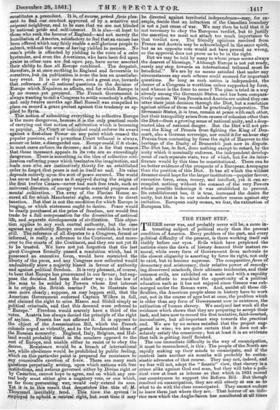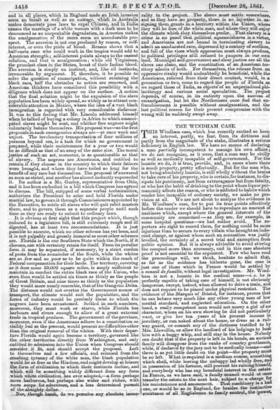THE FIRST STEP. T HERE never was, and probably never will
be, a more in- teresting subject of political study than the present condition of America. Every problem of the past, and every political difficulty of the present, is there working itself out visibly before our eyes. Evils which have perplexed the nations since the dawn of history demand their instant re- moval, while every form of Government from mob-rule to the closest oligarchy is asserting by force its right, not only to exist, but to become supreme. The comparative force of democracy and aristocracy, their relative power of remedy- ing discovered mischiefs, their ultimate tendencies, and their common evils, are exhibited on a scale and with a rapidity which affords to mankind the opportunity of a political education such as it has not enjoyed since Greece was sub- merged under the Roman wave. And, amidst all these dif- ficulties, the American people alone in history have to work out, not in the course of ages but at once, the problem which is older than any form of Government now in existence, the extinction of human slavery. We analyzed last week all the evidence which shows that they are preparing to accept their task, and have now to record the first tentative, faint-hearted, inconclusive, but all-important step towards the practical end. We are by no means satisfied that the project sug- gested is wise ; we are quite certain that it does not ab- solutely satisfy the conscience ; but at least it is an evidente that talk is getting itself finished. The one immediate difficulty in the way of emancipation, it must be remembered, is this : The people of the North are rapidly making up their minds to emancipate, and if the contest lasts another six months will probably be enthu- siastic advocates of that course. They may not, indeed, and we fear will not, adopt the "fanatic" view, that [slavery is a crime alike against God and man, but they will take a poli- tical view at least as intense as that which in 1831 moved our countrymen to support the Reform Bill. But though resolved on emancipation, they are still utterly at sea as to what to do with the class emancipated. They cannot endure to leave them just where they are. That horror of an infe- rior race which the Anglo-Saxon has manifested at all times and in all places, which in England made an Irish invasion seem an insult as well as an outrage, which in Australia makes democrats pass laws to expel Chinese, and in India causes the marriage of a white woman with a dark man to be denounced as an unspeakable degradation, in America makes the amalgamation of the races seem an unendurable pro- spect. The aversion is not one produced by reason, or self- interest, or even the pride of blood. Reason shows that a half-caste race who could work in the tropics would add to American strength; self-interest points always to the easiest solution, and that is amalgamation; while old Virginians, the proudest class in the States, boast of their Indian blood. The aversion is simply an instinct, and, like all instincts, irremovable by argument. If, therefore, it be possible to solve the question of emancipation, without retaining the black race, half the obstacles to action are removed, and American thinkers have considered this possibility with a diligence which does not appear on the surface. A notion that the final solution might be the expulsion of the slave population has been widely spread, so widely as to attract con- siderable attention in Mexico, where the idea of a vast black immigration is regarded with very considerable disfavour. It was to this feeling that Mr. Lincoln addressed himself when he talked of buying a colony in Africa to which emanci- pated slaves might be sent, and whither free negroes might voluntarily betake themselves. His proposal was—as the first proposals in such emergencies always are—at once weak and unjust. The involuntary transportation of four millions of persons beyond sea, is a task for which no government is prepared, while their maintenance for a year or two would be as difficult as that of an army of the same size. The moral justice of such an act, moreover, is as questionable as that of slavery. The negroes are Americans, and entitled to remain if they choose in the country to which their fathers were brought, and 'where they have toiled so lone for the benefit of any race but themselves. The proposal ier answered as soon as stated, and another has almost instantly superseded it. Its author is a Mr. Gurley, representative from Ohio, and it has been embodied in a bill which Congress has agreed to discuss. The bill, stripped of some verbal technicalities, authorizes the President to seize and hold Florida under martial law, to govern it through Commissioners appointed by the Executive, to settle all slaves who will quit rebel masters there, and to govern them as a separate people until such time as they are ready to submit to ordinary laws.
It is obvious at first sight that this project which, though reduced to a legislative bill, is still extremely rough and ill digested, has at least two recommendations. It is just possible to execute, which no other scheme has yet been, and it is not palpably and grossly immoral as most other schemes are. Florida is the one Southern State which the North, if it chooses, can with certainty retain for itself. From its peculiar form it may be separated, if necessary, by a strict cordon of posts from the remainder of the South, while the whites are so few and so poor as to be quite within the reach of Federal compensation for their lauds. The territory, covering as it does some 59,000 square miles, is amply sufficient to maintain in comfort the entire black race of the Union, who even then would be settled six times as thinly as the people of Great Britain, and nine times as thinly as the population they would more nearly resemble, that of the Gangetic Delta. The distance would not overtax the Government means of transport, the climate would suit the population, and the forms of industry would be precisely those to which the negroes have been accustomed. Settled in such numbers, moreover, they must work or starve, while Florida has harbours and rivers enough to allow of a great external trade in tropical produce. The government of the province, moreover, even if the Americans adhere to a constitution so visibly bad as the present, would present no difficulties other than the original removal of the whites. With their depar- ture Florida would again become a territory, governed like the other territories directly from Washington, and only entitled to admission into the Union when Congress should consider it fit, and should accept the proposal. Left to themselves and a few officials, and released from the crushing tyranny of the white man, the black population would be as free as the Hiudoos, and might develop at leisure the form of civilization to which their instincts incline, and which will be something widely different from any form which white civilization has ever adopted,—a form perhaps more barbarous, but perhaps also wider and richer, with more scope for adventure, and a less determined pursuit of the almighty dollar. Nor, though harsh, do we perceive any absolute immo- rality in the project. The slaves must settle somewhere, and as they have no property, there is no injustice in as- signing them grants in a territory within the Union, where they will be free of the white man, and where they will enjoy the climate which they themselves prefer. That slavery is a crime is. no proof that political squeamishness is a virtue, and Americana are not bound in terminating slavery to admit an uneducated race, depressed by a century of serfdom, and full of the vices which oppression must always produce, to political privileges still refused to paupers in our own land. Municipal self-government and clear justice are all the slaves can claim' and the constitution of an American ter- ritory admits of both. For themselves, the release from an oppressive rivalry would undoubtedly be beneficial, while the Americans, relieved from their direct contact, would, in a generation or two, come to regard the people of Florida as we regard those of India, as objects'of an unprejudiced phi- lanthropy and curious social speculation. The project depends, of course, in its entirety upon the success of emancipation, but let the Northerners once feel that en- franchisement is possible without amalgamation, and the last political reason for their present compromise with the wrong will be suddenly swept away.





























 Previous page
Previous page